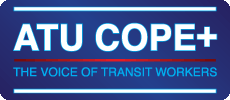Greyhound, ATU 1700 Begin Contract Negotiations
By President Bruce Hamilton
After six days of negotiations, the signs point forward for Greyhound drivers and other employees, reflecting the intercity bus industry’s recent rebound and management’s big plans. When the company and union return to the table in late October, the issues of foremost importance to members will be the ones we’ll be discussing:
- Fair compensation for all the work we do,
- Ending decades of unfairness for regular run drivers,
- Recovering our work that Greyhound shifted to subcontractors.
The company asked to get an early start on negotiations after Local 1700 members loudly protested the use of non-Greyhound drivers on Greyhound Express schedules. Texas drivers picketed outside terminals in Dallas, Houston, Austin and San Antonio, with support rallies in Phoenix and Los Angeles.
Management decided it had bitten off more than it wanted to chew in late May, after Local 1700 members marched from the Dallas station to corporate headquarters. The company offered to negotiate a larger solution to the erosion of work if the union would stop the high-profile picket lines.
This is our opportunity to raise employment and safety standards in the intercity bus industry with a contract that restores the fairness drivers and mechanics deserve. It won’t be easy, and no one ever gets everything they want in bargaining. But we are resolved to close the loopholes the company uses to deny pay claims, to be paid for all the time we spend at work, and to protect our hard-won health benefits.
Greyhound drivers’ fight for fairness and highway safety will go on after a new contract is signed. Some of the biggest issues we face cannot be solved at the bargaining table. For example, we are part of a small minority of U.S. workers who federal law does not guarantee fairness on the job. Exempting over-the-road drivers from the Fair Labor Standards Act allows Greyhound to get away with what is legally prohibited for most other employers: not paying overtime after 40 hours or paying workers for all the time they spend on the job.
Local 1700 members must remain active politically and hold our elected leaders to their word to stand with working people. Next year, ATU will continue to lobby Congress for highway safety reform that tackles the leading cause of fatal bus accidents – driver fatigue – by including us under the FLSA.







